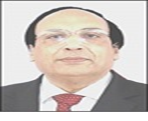Day 2 :
Keynote Forum
Minu Bajpai
All India Institute of Medical Sciences, India
Keynote: Management of Children with High Grade Bilateral Vesicoureteric reflux and Nephropathy
Time : 11:40-12:20

Biography:
Minu Bajpai is a Professor of Paediatric Surgeon at All India Institute of Medical Sciences, New Delhi, India. He is Fulbright Scholar at Johns Hopkins University, Baltimore. He is Executive Editor of Journal of Progress in Paediatric Urology. He is President of Indian Association of Paediatric Surgeons (IAPS) from 2014-2015. He Received ICMR National awards twice i.e., 1995-Dr. Kamla Menon Award in Paediatrics and 2009-Kunti Omprakash Gold Medal in Paediatrics. He founded the Indian Society for Paediatric Urology & Asian Society for Paediatric Urology in 1998. He published 201 articles in peer reviewed journals.
Abstract:
Background: Vesicoureteric reflux (VUR) is one of the most common urological problems faced by pediatric surgeons. Antibiotics are helpful for short periods and in lower grades of VUR. Continuing VUR can cause renal damage by activating the Renin Angiotensin System (RAS). Subsequently severe bilateral VUR leads to nephropathy. Antibiotic treatment, followed by endoscopic management is the answer to managing such cases till 18 months of age. If bilateral VUR still persists, surgery is the key.
Aim: To study the short term and the long-term results of anti-reflux surgery in children with severe grade bilateral VUR and nephropathy.
Methods: A prospective study conducted from July 2009 onwards at our institute and data pertaining to epidemiological, clinical (including blood pressure), biochemical markers (PRA), urine microalbuminuria, glomerular filtration rate, DMSA scan were recoded and compared in patients with severe grade bilateral VUR before & after anti-reflux surgery and after initiation of Angiotensin converting enzyme-1 inhibitors (ACE-I) therapy.
Results: A total of 26 children with severe VUR who underwent bilateral Cohen’s re-implantation were included. It was seen that 81% patients (21/26) had >20% improvement in their GFR while only 19% (5/26) showed <20% improvement in their GFR after anti-reflux surgery. There was also significant improvement in the markers of renal damage after surgery (PRA, urinary microalbuminuria, GFR, blood pressure, DMSA scan) in both the groups.
Conclusion: In patients with severe VUR, anti-reflux surgery leads to improvement in GFR and other markers of renal damage. In the long term, once the surgical effect plateaued out, the use of ACE-I also proved beneficial in such patients.
Keynote Forum
Andrew J A Holland
The University of Sydney, Australia
Keynote: Current management of undescended testes
Time : 10:00-10:40

Biography:
Andrew J A Holland graduated from London University in 1988 and obtained his FRCS in 1992. He is trained in London, Perth, Adelaide and Sydney, obtaining his FRACS. As a Surgeon Scientist Scholar of the Royal Australasian College of Surgeons, he was awarded a PhD from the University of Sydney. He became a Senior Lecturer at the university in the same year and a Consultant Paediatric Surgeon at The Children’s Hospital at Westmead. He was given a Personal Chair in Paediatric Surgery at The University of Sydney in 2010 and has over 200 publication in the scientific literature.
Abstract:
Undescended testes (UDT) remain common, with increasing evidence that acquired UDT or the ascending testis syndrome should be considered part of the spectrum in this pathology. Between 0.5 to 9% of boys may be affected depending on the quality of ascertainment, reporting, geographic location and age at presentation. There appears limited value for the use of ultrasound in the diagnosis, although it remains widely used and does not reliably differentiate between UDT and retractile testes. Prompt diagnosis and early referral for surgical evaluation and treatment would seem most likely to result in an optimal functional and cosmetic outcome as well as reducing the risks of torsion and faciltating diagnosis of any subsequent malignancy. Hormonal treatment, rather than orchidopexy, remains popular in some centers despite lack of good evidence to support its efficacy, although it may have an important adjunct role in optimizing fertility. Debate continues over the optimal surgical approach while performing an orchidopexy, whether initially laparoscopic, single or staged, a traditional inguinal open approach or via a parascrotal incision. The testis, rather than quiescent, appears biologically active in the male infant with increasing evidence of an adverse impact on future spermatogenesis and fertility in males with an UDT. Whilst not definitive, there would seem to be an increasing consenus on the value, in terms of future fertility, of earlier orchidopexy before 12 months of age. The need for earlier surgery has to be balanced against the potential risks of operative intervention and general anasethesia.
Keynote Forum
Howard I Pryor II
Johns Hopkins University School of Medicine, USA
Keynote: Mucous fistula refeeding decreases parenteral nutrition exposure in post-surgical premature neonates
Time : 10:40-11:20

Biography:
Howard I Pryor II has completed his MD and General Surgery Residency at the George Washington University; a Research Fellowship at the Massachusetts General Hospital and Pediatric Surgery Fellowship at Johns Hopkins Hospital. He is an Instructor of Pediatric Surgery at Johns Hopkins School of Medicine and an Assistant Professor of Surgery at The Uniformed Services University of Health Sciences. He has published more than 20 journal articles and chapters and serves as a reviewer of the Journal of Pediatric Surgery.
Abstract:
Premature neonates occasionally require emergent bowel resection. They are frequently left with discontinuous bowel and one or more ostomies. Further, these children are at risk for short gut syndrome and parenteral nutrition (PN) dependence. PN exposure causes hepatotoxicity and requires central venous access; therefore, maximizing enteral nutrition is desirable. One technique is via mucous fistula refeeding. Refeeding involves collecting endostomy output and introducing it into the lumen of a mucous fistula; increasing bowel absorption. We hypothesized that refed children would have decreased exposure to PN and reach goal enteral feeds earlier than non-refed children. We conducted a retrospective review of neonatal patients who underwent bowel resection and ostomy formation with our without mucous fistula creation at our institution between July 2012 and July 2014. Patients who underwent refeeding were compared to those who did not. Twenty-eight cases were identified: 13 in the refeeding group and 15 in the ostomy group. We observed that refed children required significantly shorter times to reach goal enteral feeds when compared to the ostomy group. Refed children also reached goal enteral feeds and permanently discontinued PN at an earlier time point following restoration of bowel continuity. None of the differences appear related to confounding variables as no differences were identified between the 2 groups. These findings suggest that a prospective multi-center trial of refeeding is warranted, with the goal of more clearly defining the benefits and potential side effects of mucous fistula refeeding in post-surgical premature neonates.
